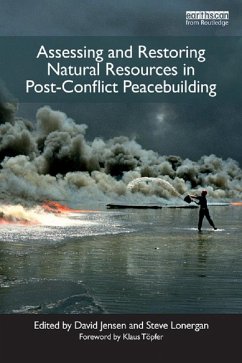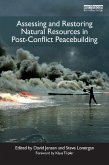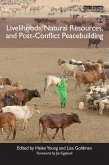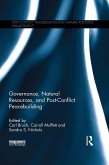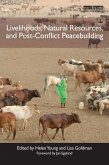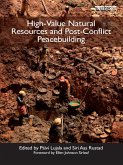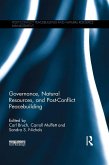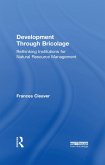Assessing and Restoring Natural Resources In Post-Conflict Peacebuilding (eBook, ePUB)
Redaktion: Jensen, David; Lonergan, Stephen


Alle Infos zum eBook verschenken

Assessing and Restoring Natural Resources In Post-Conflict Peacebuilding (eBook, ePUB)
Redaktion: Jensen, David; Lonergan, Stephen
- Format: ePub
- Merkliste
- Auf die Merkliste
- Bewerten Bewerten
- Teilen
- Produkt teilen
- Produkterinnerung
- Produkterinnerung

Hier können Sie sich einloggen

Bitte loggen Sie sich zunächst in Ihr Kundenkonto ein oder registrieren Sie sich bei bücher.de, um das eBook-Abo tolino select nutzen zu können.
Violent conflict invariably disrupts people's livelihoods, the natural environment, social and political institutions, and the economy at all levels. Restoring peace and rebuilding society can be arduous, but immediate action at the cessation of conflict is essential. This book examines how conflicts degrade natural resources and addresses the consequences for human health, livelihoods, and security. This book provides a concise theoretical and practical framework for policymakers, researchers, practitioners, and students.
- Geräte: eReader
- mit Kopierschutz
- eBook Hilfe
- Größe: 16.32MB
![Assessing and Restoring Natural Resources In Post-Conflict Peacebuilding (eBook, PDF) Assessing and Restoring Natural Resources In Post-Conflict Peacebuilding (eBook, PDF)]() Assessing and Restoring Natural Resources In Post-Conflict Peacebuilding (eBook, PDF)75,95 €
Assessing and Restoring Natural Resources In Post-Conflict Peacebuilding (eBook, PDF)75,95 €![Livelihoods, Natural Resources, and Post-Conflict Peacebuilding (eBook, ePUB) Livelihoods, Natural Resources, and Post-Conflict Peacebuilding (eBook, ePUB)]() Livelihoods, Natural Resources, and Post-Conflict Peacebuilding (eBook, ePUB)84,95 €
Livelihoods, Natural Resources, and Post-Conflict Peacebuilding (eBook, ePUB)84,95 €![Governance, Natural Resources and Post-Conflict Peacebuilding (eBook, ePUB) Governance, Natural Resources and Post-Conflict Peacebuilding (eBook, ePUB)]() Governance, Natural Resources and Post-Conflict Peacebuilding (eBook, ePUB)84,95 €
Governance, Natural Resources and Post-Conflict Peacebuilding (eBook, ePUB)84,95 €![Livelihoods, Natural Resources, and Post-Conflict Peacebuilding (eBook, PDF) Livelihoods, Natural Resources, and Post-Conflict Peacebuilding (eBook, PDF)]() Livelihoods, Natural Resources, and Post-Conflict Peacebuilding (eBook, PDF)84,95 €
Livelihoods, Natural Resources, and Post-Conflict Peacebuilding (eBook, PDF)84,95 €![High-Value Natural Resources and Post-Conflict Peacebuilding (eBook, ePUB) High-Value Natural Resources and Post-Conflict Peacebuilding (eBook, ePUB)]() High-Value Natural Resources and Post-Conflict Peacebuilding (eBook, ePUB)89,95 €
High-Value Natural Resources and Post-Conflict Peacebuilding (eBook, ePUB)89,95 €![Governance, Natural Resources and Post-Conflict Peacebuilding (eBook, PDF) Governance, Natural Resources and Post-Conflict Peacebuilding (eBook, PDF)]() Governance, Natural Resources and Post-Conflict Peacebuilding (eBook, PDF)84,95 €
Governance, Natural Resources and Post-Conflict Peacebuilding (eBook, PDF)84,95 €![Development Through Bricolage (eBook, ePUB) Development Through Bricolage (eBook, ePUB)]() Frances CleaverDevelopment Through Bricolage (eBook, ePUB)46,95 €
Frances CleaverDevelopment Through Bricolage (eBook, ePUB)46,95 €-
-
-
Dieser Download kann aus rechtlichen Gründen nur mit Rechnungsadresse in A, B, BG, CY, CZ, D, DK, EW, E, FIN, F, GR, HR, H, IRL, I, LT, L, LR, M, NL, PL, P, R, S, SLO, SK ausgeliefert werden.
- Produktdetails
- Verlag: Taylor & Francis
- Seitenzahl: 536
- Erscheinungstermin: 15. Februar 2013
- Englisch
- ISBN-13: 9781135918804
- Artikelnr.: 40465885
- Verlag: Taylor & Francis
- Seitenzahl: 536
- Erscheinungstermin: 15. Februar 2013
- Englisch
- ISBN-13: 9781135918804
- Artikelnr.: 40465885
- Herstellerkennzeichnung Die Herstellerinformationen sind derzeit nicht verfügbar.
Opportunities on the Post-Conflict Peacebuilding Agenda Part 1:
Post-Conflict Environmental Assessments Introduction 1. Evaluating the
Impact of UNEP's Post-Conflict Environmental Assessments 2. Environment and
Peacebuilding in War-torn Societies: Lessons from the UN Environment
Programme's Experience with Post-Conflict Assessment 3. Medical and
Environmental Intelligence in Peace and Crisis-Management Operations 4.
Thinking Back-end: Improving Post-Conflict Analysis through Consulting,
Adapting to Change, and Scenario Building Part 2: Remediation of
Environmental Hot Spots Introduction 5. Salting the Earth: Environmental
Health Challenges in Post-Conflict Reconstruction 6. Remediation of
Polluted Sites in the Balkans, Iraq, and Sierra Leone 7. The Risks of
Depleted Uranium Contamination in Post-Conflict Countries: Findings and
Lessons learned from UNEP Field Assessments 8. Linking Demining to
Post-Conflict Peacebuilding: A Case Study of Cambodia Part 3: Restoration
of Natural Resources and Ecosystems Introduction 9. Restoration of Damaged
Land in Societies Recovering from Conflict: The Case of Lebanon 10.
Ecological Restoration and Peacebuilding: The Case of the Iraqi Marshes 11.
Haiti: Lessons Learned and Way Forward in Natural Resource Management
Projects 12. Peacebuilding and Adaptation to Climate Change Part 4:
Environmental Dimensions of Infrastructure and Reconstruction Introduction
13. Addressing Infrastructure Needs in Post-Conflict Reconstruction: An
Introduction to Alternative Planning Approaches 14. Mitigating the
Environmental Impacts of Post-Conflict Assistance: Assessing USAID's
Approach 15. Challenges and Opportunities for Mainstreaming Environmental
Assessment Tools in Post-Conflict Settings 16. Environmental Assessment as
a Tool for Peacebuilding and Development: Initial Lessons from Capacity
Building in Sierra Leone 17. Natural Resources, Post-Conflict
Reconstruction, and Regional Integration: Lessons from the Marshall Plan
and other Regional Reconstruction Efforts 18. Making Best use of Domestic
Energy Sources: The Priority Production System for Coal Mining and Steel
Production in Post-World War II Japan 19. Road Infrastructure
Reconstruction as a Peacebuilding Priority in Afghanistan: Negative
Implications for Land Rights 20. Evaluating Post-Conflict Assistance Part
5: Lessons Learned 21. Natural Resources and Post-Conflict Restoration,
Remediation, and Reconstruction: Lessons and Way Forward
Opportunities on the Post-Conflict Peacebuilding Agenda Part 1:
Post-Conflict Environmental Assessments Introduction 1. Evaluating the
Impact of UNEP's Post-Conflict Environmental Assessments 2. Environment and
Peacebuilding in War-torn Societies: Lessons from the UN Environment
Programme's Experience with Post-Conflict Assessment 3. Medical and
Environmental Intelligence in Peace and Crisis-Management Operations 4.
Thinking Back-end: Improving Post-Conflict Analysis through Consulting,
Adapting to Change, and Scenario Building Part 2: Remediation of
Environmental Hot Spots Introduction 5. Salting the Earth: Environmental
Health Challenges in Post-Conflict Reconstruction 6. Remediation of
Polluted Sites in the Balkans, Iraq, and Sierra Leone 7. The Risks of
Depleted Uranium Contamination in Post-Conflict Countries: Findings and
Lessons learned from UNEP Field Assessments 8. Linking Demining to
Post-Conflict Peacebuilding: A Case Study of Cambodia Part 3: Restoration
of Natural Resources and Ecosystems Introduction 9. Restoration of Damaged
Land in Societies Recovering from Conflict: The Case of Lebanon 10.
Ecological Restoration and Peacebuilding: The Case of the Iraqi Marshes 11.
Haiti: Lessons Learned and Way Forward in Natural Resource Management
Projects 12. Peacebuilding and Adaptation to Climate Change Part 4:
Environmental Dimensions of Infrastructure and Reconstruction Introduction
13. Addressing Infrastructure Needs in Post-Conflict Reconstruction: An
Introduction to Alternative Planning Approaches 14. Mitigating the
Environmental Impacts of Post-Conflict Assistance: Assessing USAID's
Approach 15. Challenges and Opportunities for Mainstreaming Environmental
Assessment Tools in Post-Conflict Settings 16. Environmental Assessment as
a Tool for Peacebuilding and Development: Initial Lessons from Capacity
Building in Sierra Leone 17. Natural Resources, Post-Conflict
Reconstruction, and Regional Integration: Lessons from the Marshall Plan
and other Regional Reconstruction Efforts 18. Making Best use of Domestic
Energy Sources: The Priority Production System for Coal Mining and Steel
Production in Post-World War II Japan 19. Road Infrastructure
Reconstruction as a Peacebuilding Priority in Afghanistan: Negative
Implications for Land Rights 20. Evaluating Post-Conflict Assistance Part
5: Lessons Learned 21. Natural Resources and Post-Conflict Restoration,
Remediation, and Reconstruction: Lessons and Way Forward
